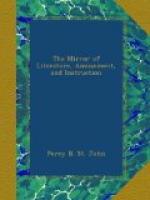Shakspeare was contemporary with Bacon, and he no doubt valued and studied with attention, the writings of that great man. The working up of the splendid dialogue between Iago and Othello, may not impossibly have been suggested by this sentence of Lord Bacon: “Breaking off in the midst of what one was about to say, (as if he took himself up) breeds a greater appetite in him with whom you confer, to know more.” (Vide Essays.)
But let us drop the tone of attempted criticism, which ill becomes an embryo writer at any time, and still less so when Shakspeare is the theme. Having mentioned Bacon, perhaps the following authenticated dialogue may not be uninteresting to the reader, especially as it is only to be met with in one or two scarce books:
(Shakspeare.) “I have heard, my lord, that a certain arch in Trinity College, Cambridge, would stand until a greater man than your lordship should pass through it.”
(Bacon.) “Did you ever pass through it, Mr. Shakspeare?”
(Shakspeare.) “No, my lord, I never was at Cambridge.”
(Bacon.) “Then we cannot decide which of us two is the greater man. I am told that most of the professors there pass under the arch without tear; which indeed shows a wise contempt of the superstition.”
(Shakspeare.) “I rejoice to think that the world is yet to have a greater man than your lordship, since the arch must fall at last.”
Several of Shakspeare’s least amusing plays are supposed to be not of his composition, such as Henry VI., and Troilus and Cressida, with the exception of the master-touches and some of the finer speeches, which probably were introduced by him. This, however, is a trick of trade in every department of science; and when we see, for instance, the collected works of some great artist, it would be ridiculous to suppose that his whole lifetime could have sufficed for so much handicraft, and perhaps in reality, only the faces and more delicate parts were the work of his pencil.
To return to Shakspeare. The objections to his style, which are many, especially to a more modern reader, are excusable from several causes. The writers of the Elizabethan age and previously, were all of them very coarse in their mode of expression, and the dramatists not very delicate in their plots, though in doing so they did but obey the dictates of fashion and the bad taste of the times. Even prolixity and circumlocution were countenanced, and the insufferable conceits we meet with in the poems of Donne, Cowley, and others, were highly relished in those days. Euphaeism (mentioned so often by Sir W. Scott in The Abbot,) was also then in vogue, and all these various peculiarities of style, language, &c. were indispensable in all that was offered to the public. Shakspeare’s fondness and propensity for punning may claim the same excuse, viz. “the hoary head and furrowed face of custom;” yet there are some of these puns interspersed through his works, which are sad blots indeed to our modern fastidious eyes, and that we could well wish to see expunged; such a one now is this:




